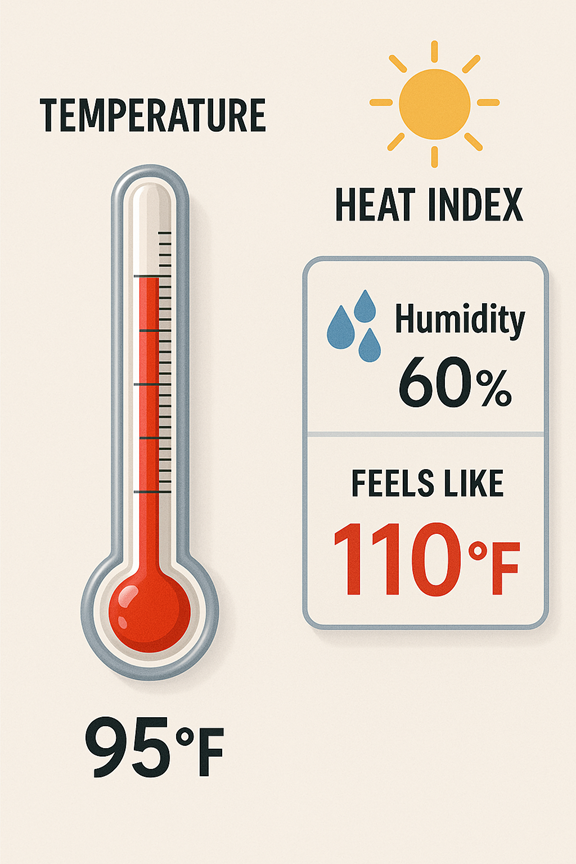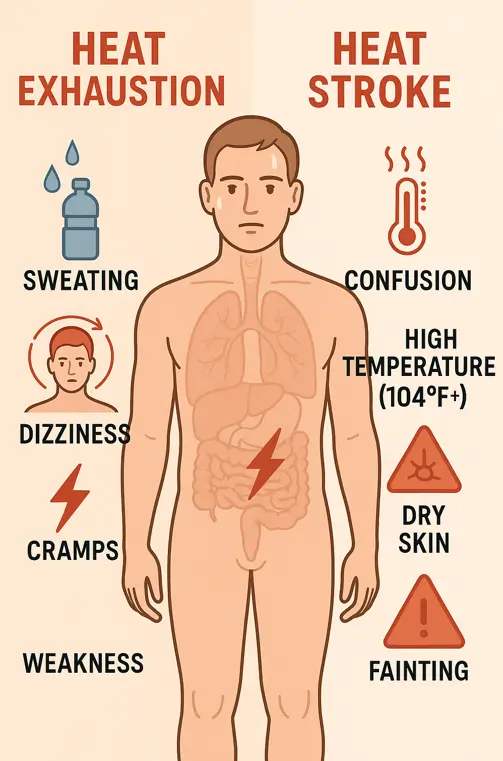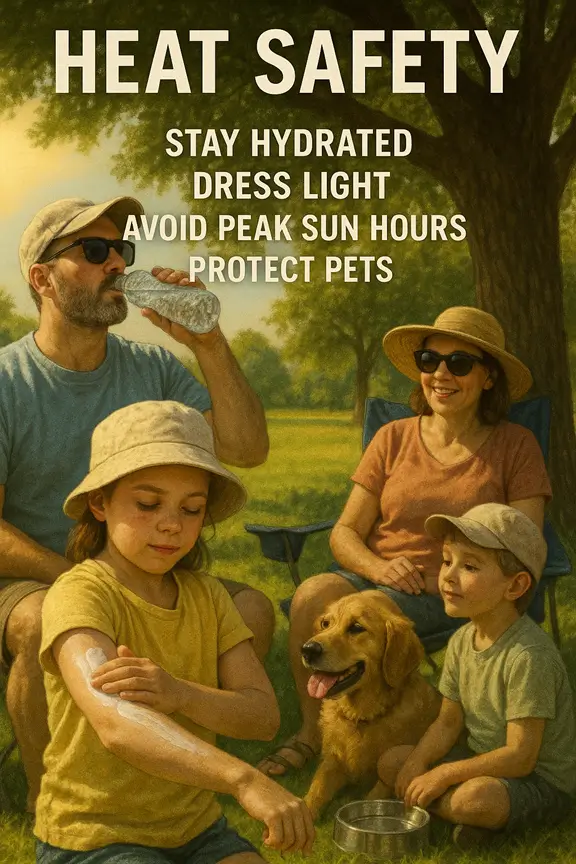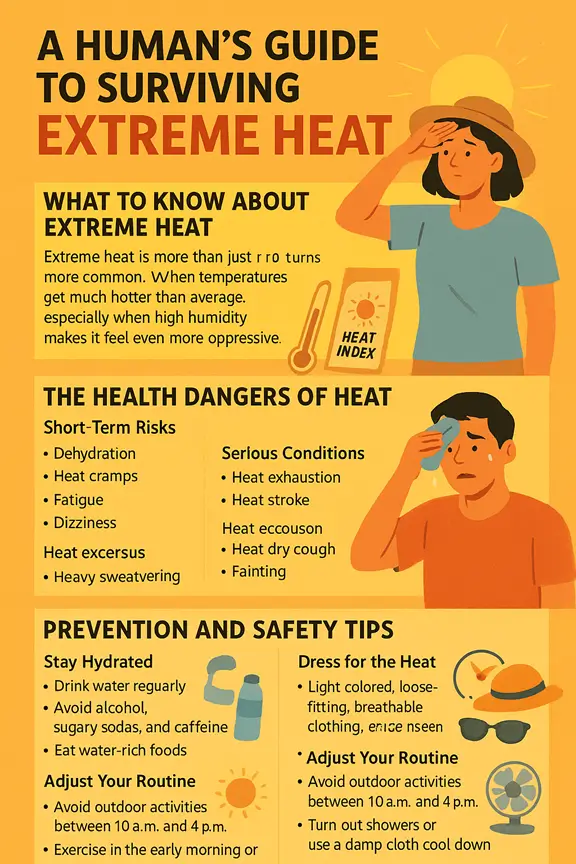Extreme heat is becoming more and more common. As global temperatures rise, so does the risk of intense, life-threatening heat waves. Every year, thousands of people end up in the hospital, and many lose their lives, due to heat-related illnesses. The good news is that with some simple precautions, you can stay safe and protect the people you care about.
This guide covers everything you need to know about staying safe in a heat wave, from understanding the risks and recognizing warning signs to emergency preparation and caring for those most at risk.
What to Know About Extreme Heat
Extreme heat is more than just a hot day. It’s when temperatures get much hotter than average, especially when high humidity makes it feel even more oppressive. Here’s a breakdown of what that means:
Temperature vs. Heat Index: The temperature is just the number on the thermometer. The heat index is what it actually feels like when you add humidity into the equation. For example, a 95°F day with 60% humidity can feel like 110°F.
Climate Change: The rise in global temperatures is directly linked to more frequent and intense heat waves. We’re seeing this play out all over the world, with the U.S. Pacific Northwest experiencing record-breaking 116°F temperatures in 2021.


The Health Dangers of Heat
Heat can affect your body in many ways, from short-term issues to serious medical emergencies.
- Short Term Risks
- Dehydration
- Heat cramps
- Fatigue and dizziness
Serious Conditions
Heat Exhaustion: This is your body’s way of telling you it’s getting overwhelmed by the heat. Symptoms include heavy sweating, weakness, nausea, dizziness, and cramps. If this happens, find a cool place, rest, drink water, and use cool cloths to lower your body temperature.
Heat Stroke: This is a medical emergency. Your body is no longer able to cool itself down. Symptoms include a body temperature over 104°F, confusion, hot and dry skin (your body stops sweating), and fainting. Call emergency services immediately. While you wait for help, try to cool the person down with water or ice packs.
Who Is Most at Risk?
While anyone can be affected by extreme heat, some people are more vulnerable. Make sure to check on:
- The elderly (65+)
- Infants and young children
- Outdoor workers (construction, delivery, farm workers)
- Athletes
- People with chronic health conditions (heart disease, diabetes, asthma)
- People without access to air conditioning
Prevention and Safety Tips
The best way to stay safe is to be prepared. Here are some key tips:
Stay Hydrated
Drink water regularly, even if you don’t feel thirsty. A good rule of thumb is about a cup every 20 minutes.
Avoid alcohol, sugary sodas, and caffeine, which can dehydrate you.
Eat water-rich foods like watermelon, cucumbers, and oranges.
Dress for the Heat
Wear light-colored, loose-fitting, breathable clothing.
Protect yourself from the sun with a wide-brimmed hat, sunglasses, and sunscreen with an SPF of 30 or higher.
Adjust Your Routine
Avoid outdoor activities between 10 a.m. and 4 p.m., when the sun is strongest.
Exercise in the early morning or evening.
Take cool showers or use a damp cloth to cool down.

Home Cooling & DIY Hacks
If you don’t have air conditioning, or if the power goes out, you can use these simple tricks to keep your home cooler:
Block the Sun: Keep curtains or blinds closed during the day to block sunlight and prevent your home from heating up.
Create an Ice Fan: Place a bowl of ice or a frozen bottle of water in front of a fan. As the air blows over the ice, it will create a mist of cool air, lowering the room temperature.
Ventilate at Night: Open windows at night to let in cooler air and create a cross-breeze. Close them first thing in the morning before the sun gets too hot.
Turn off Heat-Generating Appliances: Avoid using the oven or dryer, as they can significantly increase the heat in your home.
Travel & Outdoor Safety
Planning to be on the move during a heat wave? Stay safe on the road and on the trail.
Car Safety: Never, ever leave a child or a pet in a parked car, even for a minute. The temperature inside a car can rise to deadly levels in a matter of minutes.
Carry Water: Always have a reusable water bottle with you and refill it whenever you can.
Plan Ahead: Check the weather before you leave. If you’re going on a hike or a long drive, research where you can find water or a place to cool down along the way.
Park Smart: Look for shaded parking spots to keep your car from becoming an oven.
Workplace Safety
Outdoor workers are at a higher risk of heat-related illnesses. Employers and employees should take precautions to stay safe.
Take Shaded Breaks: Take frequent rest breaks in a shaded or cool area to allow your body to recover.
Stay Hydrated: Drink water constantly throughout the day.
Use a Buddy System: Check on your coworkers regularly to watch for signs of heat stress.
Wear Appropriate Gear: Use wide-brimmed hats and light-colored clothing.
Emergency Checklist
It’s a good idea to have a plan in case of an emergency, especially a power outage.
- Emergency Heat Kit Essentials
- Put together a kit with essentials like:
- Reusable water bottles
- Electrolyte packets
- A first-aid kit
- A portable fan
- A fully charged power bank for your phone
- Frozen water bottles to keep things cool and for drinking as they melt.
Mental Health & Heat Stress
Extreme heat can affect your mental well-being in addition to your physical health.
Irritability and Stress: High temperatures can make you feel more irritable and stressed.
Sleep Issues: It’s often difficult to get a good night’s sleep when it’s hot. Try to keep your bedroom as cool as possible.
Stay Connected: Heat can make you feel isolated. Talk to friends or family and seek professional help if you’re struggling.
Community & Climate Preparedness
We are stronger together. Here’s how to prepare on a community level.
Know Your Cooling Centers: Find out where public cooling centers, like libraries or community centers, are located in your area.
Check on Neighbors: Look out for elderly neighbors or others who may be vulnerable and living alone. A quick phone call or visit can make a huge difference.
Advocate for Green Spaces: Support local efforts to plant more trees and create green spaces, which can significantly lower local temperatures.

Common Myths vs. Facts
Myth: Fans alone prevent heat stroke. Fact: Fans are not effective when temperatures are above 90°F because they just circulate hot air. They can even make dehydration worse.
Myth: Soda or beer will keep you hydrated. Fact: Sugary drinks and alcohol can actually make dehydration worse. Stick to water or drinks with electrolytes.
How much water should I drink?
Aim for at least 2 to 4 liters a day, and even more if you’re working outdoors.
Can I exercise safely?
Yes, but only in the early morning or evening. Stay hydrated and take frequent breaks.
What are the main differences between heat exhaustion and heat stroke?
Heat exhaustion is a warning sign of your body overheating, with symptoms like heavy sweating and dizziness. Heat stroke is a medical emergency where your body’s cooling system has failed, leading to a high body temperature and a lack of sweating.
Can heat affect my mental health?
Yes, heat can cause stress, anxiety, and sleep issues. Keeping your home cool can help.
